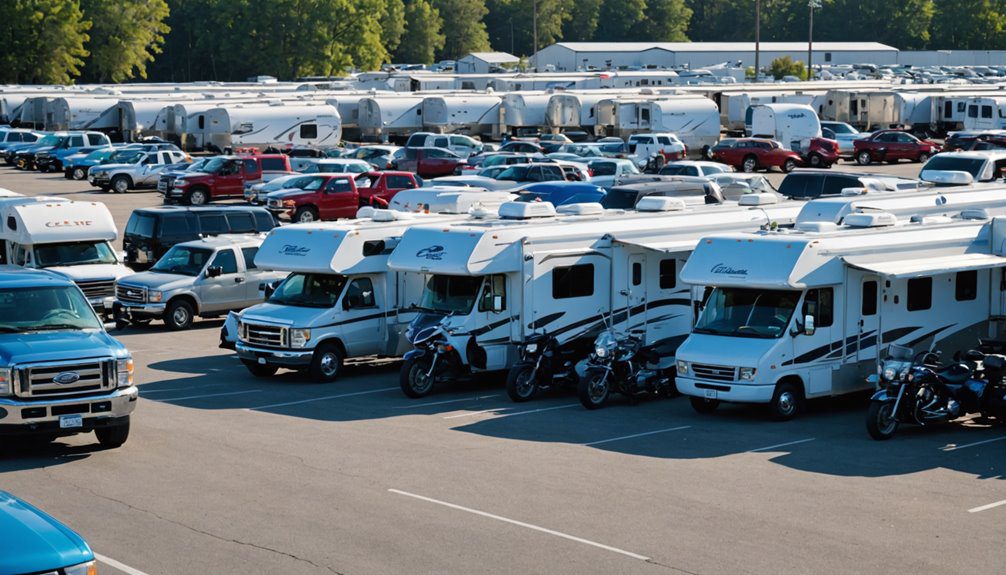If you're looking to operate as a wholesale auto auction, travel trailer, or motorcycle dealer in South Carolina, you'll need to secure a $15,000 bond. This requirement isn't just a formality; it safeguards your business and builds trust with your customers. Understanding the specifics of this bond can make a significant difference in your operations and compliance. However, navigating the application process and ensuring you meet all regulatory standards can be challenging. So, what are the key benefits and potential pitfalls you should be aware of before moving forward?
Understanding the Bond Requirement

When entering the South Carolina wholesale auto auction market, understanding the bond requirement is crucial.
You'll need to secure a $15,000 bond to operate legally as a dealer. This bond acts as a financial guarantee that you'll adhere to state regulations and uphold ethical business practices. It's not just a formality; it protects consumers and ensures that you're committed to maintaining industry standards. Additionally, these bonds provide financial protection for consumers against potential dealer negligence or fraud.
To obtain this bond, you'll need to work with a surety company that assesses your creditworthiness and business history. They'll evaluate your financial stability and may require additional documentation.
Once approved, you'll pay a premium based on your credit score and other factors. This bond must be renewed periodically, so staying on top of your obligations is essential.
Failure to obtain the bond can prevent you from participating in auctions, limiting your business opportunities. Moreover, any violations of the law can result in claims against your bond, which can jeopardize your standing within the industry.
Understanding these requirements from the outset will help you navigate the market successfully and maintain a reputable business.
Benefits of the ,000 Bond
Securing a $15,000 bond offers numerous advantages that can significantly enhance your auto auction business. First and foremost, having this bond demonstrates your commitment to ethical practices and compliance with state regulations. This builds trust with both buyers and sellers, which is crucial for establishing a solid reputation in the industry.
Additionally, the bond serves as a financial safety net. It protects your clients against potential losses due to your business's failure to meet contractual obligations. This assurance can be a powerful selling point, attracting more customers to your auctions.
Moreover, many potential partners and lenders will view your bond as a sign of credibility, making it easier for you to secure financing or establish fruitful business relationships.
Lastly, being bonded can often lead to reduced insurance premiums, as it signals to insurers that you're a lower-risk business. This can save you money in the long run. Furthermore, maintaining compliance with state regulations is essential for avoiding penalties and ensuring the longevity of your business operations.
Application Process Overview

Once you've decided to invest in a $15,000 bond, it's important to understand the application process.
Start by gathering necessary documentation, such as your business license, financial statements, and any relevant personal identification. These documents will help demonstrate your credibility and financial stability to the surety company.
Next, you'll need to choose a reputable surety company. Research your options and consider their experience, customer reviews, and rates.
Once you've selected a surety, reach out to them to begin the application process. They'll provide you with an application form, which you'll fill out with your business details and any required financial information.
After submitting your application, the surety will review it and assess your risk. This may involve a credit check and an evaluation of your financial background. Be prepared to answer any additional questions they might have.
If approved, you'll receive a quote for the bond premium. Once you agree to the terms, finalize the paperwork, pay the premium, and the surety will issue your bond.
It's crucial to ensure that you comply with all applicable state regulations for oversized vehicles, especially if you plan on transporting larger items through your auction business.
With your bond in hand, you're ready to operate your auction business legally and confidently.
Compliance and Regulatory Standards
Understanding compliance and regulatory standards is crucial for running a successful wholesale auto auction in South Carolina. You need to familiarize yourself with both state and federal regulations that govern the auto auction industry. This includes adhering to the South Carolina Department of Motor Vehicles (DMV) requirements, which outline the necessary licenses and permits for your operation.
You'll also want to ensure that your auction practices meet the standards set by the National Auto Auction Association (NAAA). This organization provides guidelines on ethical practices and transparency, which are essential for maintaining trust with buyers and sellers alike. Additionally, it's important to stay updated on changes in legislation that could impact your business.
Another key aspect of compliance is handling consumer protection laws. This includes proper disclosure of vehicle history and conditions to avoid legal issues down the line. Furthermore, acquiring the necessary Illinois Surety Bonds can help protect against financial loss due to non-compliance with state regulations.
Common Challenges Faced

Navigating the wholesale auto auction landscape in South Carolina can throw up a range of challenges that operators must tackle head-on.
One significant hurdle is understanding the ever-changing regulations. You must stay updated on local laws and auction rules, which can vary and impact your operations. Missing a crucial update could lead to costly penalties.
Another challenge is ensuring proper documentation for all transactions. Incomplete or inaccurate paperwork can delay sales and create disputes. It's essential to double-check every detail to avoid these pitfalls.
You'll also face competitive pressure from other dealers. With many players in the market, standing out becomes vital. If you don't have a strong strategy for pricing and marketing, you may struggle to attract buyers.
Additionally, managing inventory can be tricky. Keeping track of vehicles, travel trailers, or motorcycles and ensuring their condition meets buyer expectations requires diligence. Furthermore, securing the appropriate surety bonds is crucial to ensure compliance and protect against potential liabilities.
Tips for Successful Bonding
Securing a wholesale auto auction bond in South Carolina is crucial for your business's success, and there are several key strategies to make the process smoother.
First, ensure you understand the bond requirements thoroughly. Knowing the specifics can help you avoid unnecessary delays.
Next, work on improving your credit score. A better credit rating can lead to lower premiums and make you a more appealing candidate to bond providers.
Gather all necessary documentation ahead of time, including financial statements and proof of business operation. This preparation demonstrates your professionalism and can expedite the bonding process.
It's also wise to shop around for different bond providers. Comparing rates and terms can save you money and allow you to find the best fit for your needs.
Don't hesitate to ask questions during this process; clear communication can help clarify any uncertainties.
Lastly, maintain a good relationship with your bonding agent. Keeping them informed about your business developments can foster trust and may lead to better bonding options in the future. Additionally, understanding the parties involved in the bonding process can help you navigate negotiations more effectively.
Conclusion
In summary, securing the $15,000 bond is crucial for your success as a wholesale auto auction, travel trailer, or motorcycle dealer in South Carolina. Not only does it demonstrate your commitment to compliance and consumer protection, but it also boosts your credibility in the marketplace. By understanding the application process and overcoming common challenges, you can navigate the bonding requirements smoothly. Remember, this bond is your key to operating with integrity and building trust with your customers.


